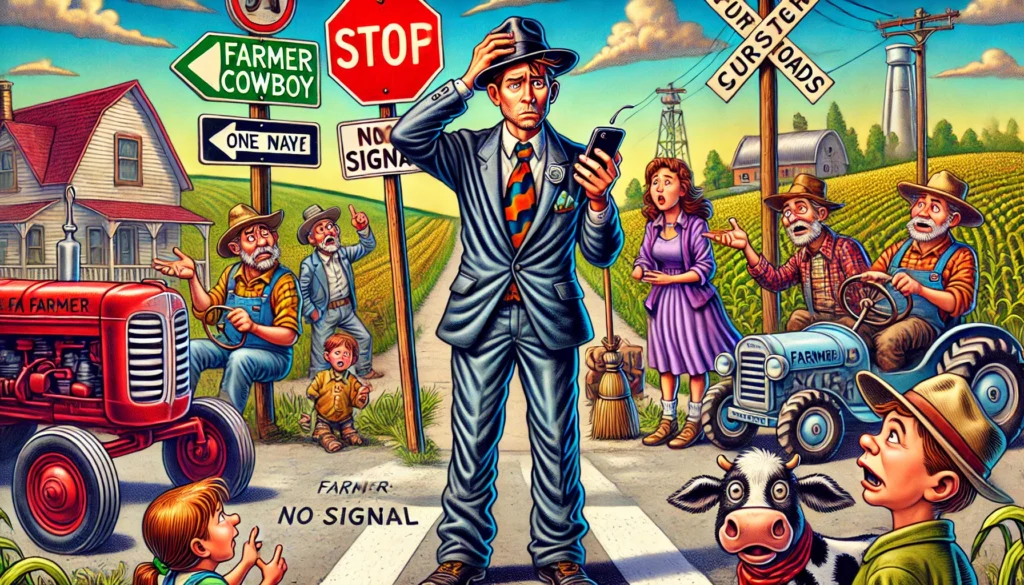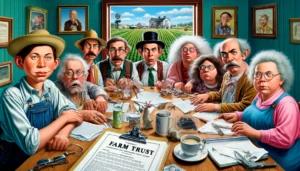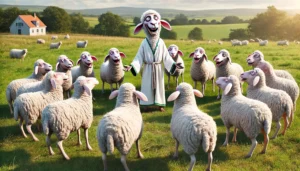
Rural Myths A vivid and detailed illustration in the style of FarmerCowboy.com showing a big city slicker lost and confused in a small town env2.webp.webp
Rural Folks Are Always Friendly
Every rural resident is a charming, friendly neighbor who greets you with a warm smile and a homemade pie. The reality? Sure, some country folks are friendly, but others might just be as grumpy as a rooster at dawn. And that homemade pie? It might come with a side of unsolicited advice on your life choices. One local, Edna Mae, known for her sharp tongue and sharper pies, quips, “I’ll give you a pie if you promise to never come back asking for another!” It seems not all country hospitality is created equal.

Everyone Knows Everyone
The belief that everyone in rural areas knows everyone else’s business sounds cozy, but it’s far from accurate. Yes, small towns have fewer people, but that doesn’t mean they’re all in each other’s business. Some folks prefer the company of their cows to the company of their neighbors. Farmer Joe from Green Acres candidly admits, “I know my cows better than I know the Johnsons next door. At least my cows don’t spread rumors.” So much for the notion of one big, happy family.

Rural Life is Slower and Peaceful
City dwellers often imagine the countryside as a serene, slow-paced haven where stress doesn’t exist. If by peaceful you mean the constant noise of tractors, roosters, and the occasional cow escape, then sure, it’s peaceful. And slow-paced? Try telling that to a farmer during harvest season. An exhausted farmer put it best: “Peaceful? I haven’t had a peaceful moment since my tractor broke down in ‘96.”

The Internet Doesn’t Exist in Rural Areas
There’s a common misconception that rural areas are a technological wasteland where the internet is a distant dream. While rural internet might not be as fast as city connections, it does exist. And let’s be honest, slow internet speeds can be a blessing. It gives you an excuse to avoid those endless Zoom meetings. Local teacher Ms. Bates jokes, “Buffering is my best friend. It gives me time to drink my coffee while my lesson plans load.” So, rural folks are just as connected, if not more strategically disconnected, than their urban counterparts.

Everyone is a Farmer
The stereotype that every rural resident is a farmer with a sprawling estate and endless fields is simply not true. Not everyone in the countryside is a farmer. Some are teachers, nurses, mechanics, or even tech-savvy entrepreneurs. But don’t be surprised if your mechanic can also give you tips on raising chickens. Bob, a local mechanic, proudly declares, “I’m a mechanic by day, chicken whisperer by night.”
Wildlife is Friendly
The idea that animals in the countryside are friendly and will eat out of your hand is as misleading as it gets. Wildlife can be more dangerous than friendly. From aggressive roosters to territorial geese, rural animals aren’t exactly the cuddly creatures you see in Disney movies. Farmer Tim shares a cautionary tale: “I lost a fight to a goose once. Now I carry a stick whenever I go near the pond.” It turns out, rural wildlife requires as much respect as admiration.
Rural Life is Cheap
The notion that living in the countryside is inexpensive and easy on the wallet is a myth many city folk cling to. While housing might be cheaper, the cost of maintaining a farm, buying equipment, and dealing with unexpected repairs can quickly add up. Farmer Bill lamented, “I spent more on my tractor last year than I did on my house. And don’t get me started on the cost of feed.” Rural living comes with its own set of financial challenges.
There’s Nothing to Do
Urbanites often think rural areas are boring with nothing to do for entertainment. While there might not be as many nightclubs or theaters, rural areas have their own brand of fun. From county fairs to barn dances, there’s never a dull moment. Local teenager Jenny finds pig races at the county fair more thrilling than any video game. “You haven’t lived until you’ve seen a pig race at the county fair,” she says with a grin. Rural entertainment may be different, but it’s far from lacking.
Rural Areas Are Isolated
Living in the countryside means you’re cut off from civilization and modern conveniences, or so the myth goes. While rural areas might be more spread out, they’re not isolated. Most small towns have everything you need, from grocery stores to clinics. And let’s not forget the sense of community that’s often stronger in rural areas. Mary from Green Acres boasts, “I can get to town in 15 minutes. And everyone there knows me by name.” It appears that rural isolation is more myth than reality.
Rural Life is Simple
The simplicity of rural life means fewer worries and responsibilities, right? Wrong. Rural life can be anything but simple. Managing a farm, dealing with unpredictable weather, and ensuring your livestock are healthy is a complex and demanding job. Rancher Dave shakes his head and says, “Simple? Try telling that to a farmer during a drought. We have our own set of challenges, and they’re not simple at all.” The simplicity of rural life is a romanticized illusion.
Everyone Wears Overalls
The image of every rural resident in overalls and straw hats is a charming but outdated stereotype. While overalls are practical, they’re not the only fashion choice. You’ll find plenty of folks in jeans, t-shirts, and even the occasional business suit. Farmer Steve reassures, “I wear overalls when I’m working, but I clean up nice. You should see me at church on Sundays.” Rural fashion is as varied as anywhere else.
Farming is a Hobby
The idea that farming is a relaxing hobby for rural residents couldn’t be further from the truth. Farming is a full-time job that requires dedication, hard work, and a lot of sweat. Farmer Mike laughs at the notion, saying, “If farming is a hobby, then it’s the most exhausting hobby I’ve ever had. It’s more like a lifestyle.” Farming is serious business, not a weekend pastime.
Rural Areas Lack Diversity
The misconception that rural areas are homogenous with little cultural diversity is outdated. Rural areas are becoming more diverse, with people from various backgrounds bringing their unique cultures and traditions. Sue, the local librarian, enjoys the diverse dishes at town potlucks. “Our town potluck now features dishes from around the world,” she notes. “It’s like a mini United Nations.”
No One Travels
The belief that rural residents never leave their hometowns and are unfamiliar with the outside world is simply false. Many rural residents travel just as much as their urban counterparts. Whether for work, vacation, or family visits, they’re not as isolated as you might think. Farmer Jane brags, “I’ve been to more countries than my city cousin. And I have the fridge magnets to prove it.”
Rural Residents Are Uneducated
The stereotype that people in the countryside lack education and sophistication is both unfair and untrue. Many rural residents hold degrees and are well-informed about various subjects. Education is valued, and schools in rural areas are dedicated to providing quality education. Teacher Tom asserts, “Just because we live in the country doesn’t mean we’re ignorant. We have brains and we use them.”
All Meals Are Farm-to-Table
The romantic notion that every meal in the countryside is freshly harvested from the backyard garden is an exaggeration. While many rural residents do grow their own food, they also enjoy the convenience of grocery stores and the occasional fast food. Farmer Lucy admits, “I love a good home-cooked meal, but sometimes you just need a burger and fries.”
Rural Life Is All About Hard Work
The myth that rural residents spend all their time working with no time for leisure overlooks the balance they maintain. While hard work is a big part of rural life, there’s also plenty of time for relaxation and fun. From fishing trips to community picnics, rural residents know how to enjoy life. Rancher Sam smiles, “Work hard, play hard. That’s our motto.”
Rural Areas Are Behind the Times
The misconception that the countryside is stuck in the past, with outdated technology and practices, is far from accurate. Rural areas are embracing modern technology, from drones in agriculture to high-speed internet. Farmer Ted boasts, “We might be in the middle of nowhere, but we’ve got the latest gadgets. And we know how to use them.”
Everyone Has a Perfect Lawn
The belief that every yard in the countryside is perfectly manicured and free of weeds is an urban legend. Maintaining a large yard can be challenging, and not everyone has the time or energy to keep it pristine. Farmer Pete declares, “My lawn is a jungle, and I like it that way. It’s good for the bees.”
Rural Residents Are All Traditionalists
The stereotype that people in the countryside are set in their ways and resistant to change is outdated. Rural residents can be just as progressive and open-minded as anyone else. They’re often at the forefront of sustainable practices and innovative solutions. Eco-Farmer Lily proudly states, “We’re not stuck in the past. We’re paving the way for the future.”

Disclaimer
This satirical article is a playful exploration of urban legends about rural life and should be taken with a grain of salt (or a bale of hay). Any resemblance to actual persons, living or dead, is purely coincidental and meant for humorous purposes. The myths and realities presented here are exaggerated for comedic effect, and no cows were harmed in the making of this article. Remember, whether you live in a bustling city or a quiet countryside, laughter is universal. Enjoy the humor, and if you ever visit Green Acres, don’t forget to bring pie—Edna Mae insists.
Originally Published at FarmerCowboy.com
2024-08-05 07:15:47
Karl Hoffman is a distinguished agriculturalist with over four decades of experience in sustainable farming practices. He holds a Ph.D. in Agronomy from Cornell University and has made significant contributions as a professor at Iowa State University. Hoffman’s groundbreaking research on integrated pest management and soil health has revolutionized modern agriculture. As a respected farm journalist, his column “Field Notes with Karl Hoffman” and his blog “The Modern Farmer” provide insightful, practical advice to a global audience. Hoffman’s work with the USDA and the United Nations FAO has enhanced food security worldwide. His awards include the USDA’s Distinguished Service Award and the World Food Prize, reflecting his profound impact on agriculture and sustainability.





What do you get when you cross a cow with a lawn mower? A grass-fed machine!